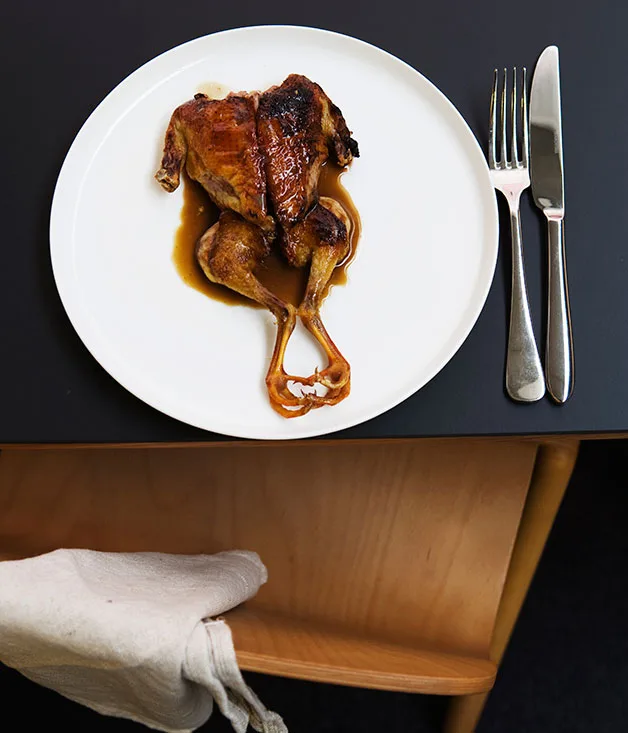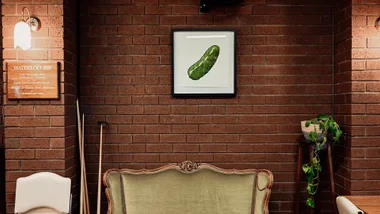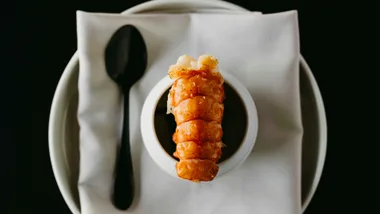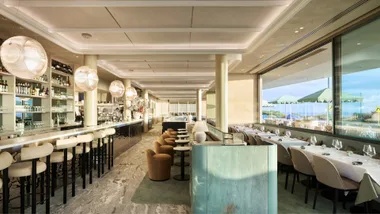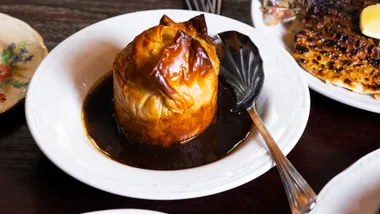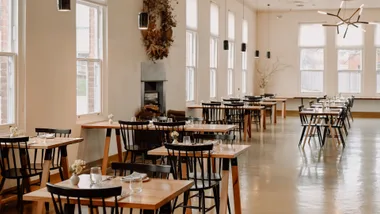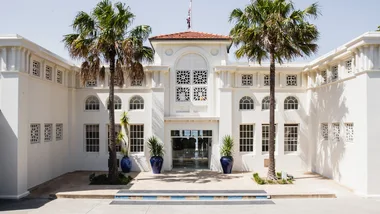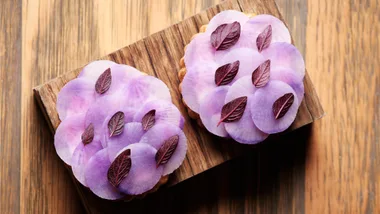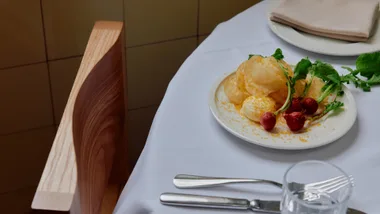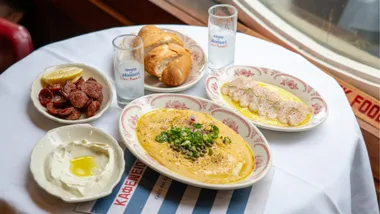30 Argyle St, Hobart, Tas, (03) 6234 3375.
Licensed.
Cards AE MC V EFT.
Open Thu-Mon 5.30-10pm.
Prices Entrées $11-$18, main courses $21-$34, desserts $10-$14.
Vegetarian By request.
Noise Not a problem.
Wheelchair access Yes.
Minus Not as handy for Sydney as it could be.
Plus But another great reason to plan a weekend in Hobart.
The keen-eyed reader of this magazine will notice that this month’s Sydney review is set in one of the city’s southernmost reaches, in an emerging neighbourhood we like to call Hobart. Admittedly it’s a bit more of a schlep from the eastern beaches or the lower north than Redfern, but you have to admit that the parking is excellent. But hey, these are the lengths to which the dedicated diner is willing to go in search of the Next Big Thing, and right now that thing is Franklin.
Let’s do a quick inventory of its credentials: sensitively converted heritage building, wood-fired oven, sustainable ethos, natural-leaning wine list, great bar menu, a touch of Australiana, chef with a beard. It’s all there. And yet nothing here has a paint-by-numbers feel.
David Moyle is part of the Andrew McConnell army, having served as co-head chef with Matt Wilkinson at Circa in Melbourne back in the day. (So many McConnell alumni now occupy senior positions in top kitchens that in my more paranoid moments I wonder if they’re all just waiting for him to press a button or utter a code-word to activate their programming and take over the country. You can’t say I didn’t warn you.) Moyle did some impressive food at Pacific Dining Room in Byron Bay back in the noughties before trading the comely breaks of The Pass and Wategos Beach for the chillier thrills of Peppermint Bay south of Hobart, where he headed the kitchen at The Stackings.
He stayed on cooking long enough to win GT‘s Regional Restaurant of the Year award in 2013.
Then the owners of Peppermint Bay, Penny Clive and Bruce Neill, bought the building that had housed The Mercury, Hobart’s daily paper, with a view to making the historic, Deco-bedecked site a new creative hub for the Tasmanian capital. The plan included a restaurant, and here we are. Franklin takes up most of the ground floor, where the presses once ran. Moyle, co-owner Ben Lindell and their team also own Betsey, a brilliant café to the front of the space, and the food offer is rounded out by the new home of the excellent Pigeon Whole Bakers, a separate (but symbiotic) business.
Franklin’s lines are cool, with long crisp surfaces of timber and concrete, but not chilly. The floor is heated, hides are thrown hither and yon, and detailing is picked out in copper. The lighting is rich and elegant, and plants erupt from behind walls and across skylights. It’s pretty dang chic but isn’t too cool-for-school to have the bar menu chalked straight onto the concrete.
The real warmth in the room, though, comes from the hearth. Franklin’s Scotch oven is unlike a pizza oven, say, in that you’ve got the firebox on one side, the bit you cook things in in the middle and then off to the other side is the flue. The heat gets drawn through the oven chamber, but it’s not so scorchy and smoky as your regular wood-fired number.
The oven is the Promethean spark that brings life to the menu. The carte isn’t clipped, and I wouldn’t quite call it austere, but it’s clear that Moyle likes to keep the edit tight. If the menu at Franklin has anything resembling a focal point (beyond the oven) it’s the sea. And when seafood so seldom benefits from baroque presentation, this lack of clutter makes a lot of sense.
There’s something tremendously appealing about the little metal tray of steamed periwinkles. The tactile pleasure of picking up their whorled shells, the adventure of fishing out the meat with a toothpick, the sweet, briny deliciousness of the flesh itself, with or without the accompanying aïoli or lemon. “Raw fish” translates on the day as slices of albacore and yellowfin tuna, cut to the thickness of good sashimi, with barely a hint of a chill on them. They’re scattered with horseradish, sea celery and crunchy leaves of fried saltbush and there’s further textural intrigue from fine strings of mermaid tresses seaweed, but the dish still turns on the interesting contrast between the pale, lush albacore and the meaty firmness of the yellowfin.
These things are also very fairly priced. The periwinkles are $11, the tuna $9 and the sea urchin $6. Visit Franklin with some unrepentant wine maniacs, order up big and you could easily clock up $250 a head; but sidle up to the wine bar for a beer and a few snacks and you can leave well fed and watered with change from $50 in your pocket.
Then again, pushing the boat out a bit with the wine is a very good thing here. Moyle says he’s grateful to Luke Burgess and his friends at Garagistes for having first stuck their necks out in Hobart with a list that was boldly international in its outlook. Like at Garagistes, the list here (which is written by the chef, and beverage manager Forbes Appleby) is focused for the most part on wines made in an artisanal manner, usually farmed organically or biodynamically, with a minimum of interference from the winemaker once the grapes are crushed. Darlings of the natural wine scene such as Bornard, Dinavolino, and Occhipinti, and our own D’Meure, Jauma and Bobar are here in force. There’s not a cab sav on the list – and bugger-all shiraz and chardonnay for that matter.
Wine obsessed as they are, they’re not doctrinaire about the way the list is put together, checking the sulphur levels on the label. “We’re just going off our own palates,” says Moyle. “Anyone can bring anything in and if we like it, we’ll put it on.” If all else fails, tinnies of Moritz are on hand for more direct refreshment.
There’s an entirely different sort of refreshment on offer in the bowl of calamari broth. The team dries the trim from the calamari in the oven overnight and then uses it to flavour an Asian-style chicken broth. There’s Japanese turnips in there, some fine shavings of squid, maybe some dried squid, sometimes a mayonnaise made from confit tuna. Savoury richness for days, in other words, but light on fat. It’ll be topped with some variation on the theme of obscure plants – sculpit leaves, say, and society garlic flowers. It’s the sort of thing you’d expect to see at Quay, say, or Attica. And it’s $15.
A very different broth underpins the smoked bone marrow rice. Again, making use of each phase of the oven’s cycle over the day, from first flame to cool-down, Moyle smokes marrow bones when he’s first lighting the oven, then makes a stock to cook the rice in, then finishes it with the marrow he’s taken out of the bones and whipped, and fine strands of raw celeriac. Slam dunk.
Really outstanding local seafood can be surprisingly hard to get in Hobart, which makes the focus at Franklin all the more bracing. Steamed clams pop and sing with their fried bread, peas and lovage ensemble, while whole King George whiting gets the wood-roasting treatment, its cavity stuffed with lemon leaves, a sea urchin butter to finish.
Then there’s the blow-out dish. Tasmania’s abalone is so prized overseas that we almost never see it in any but the fanciest of restaurants back home. Here it’s a show-stopper, steamed, taken out of the shell, wrapped in bull kelp, roasted to tenderness in the oven, sliced and served with a sauce of the abalone’s liver, dried oyster, black pepper and whisked egg white. All it needs is a little wet-cooked buckwheat on the side, done a bit like a Vietnamese broken rice. There again, with some of Pigeon Whole’s remarkable ruby-wheat bread on the table and the oyster butter Moyle serves it with, you’d have the makings of a profoundly decadent $90 sandwich.
Squab-fanciers of my acquaintance reckon that Moyle is in a class of his own when it comes to roasting birds. I don’t know that I’m qualified to weigh in on that argument, but I can vouch that the pigeon at Franklin hits that sweet spot where it is still most certainly rare, but has been cooked enough to really bring out its savour. There’s some mildly satanic stuff going on behind the scenes in the kitchen to press the blood out of the spine to finish the fine and savoury sauce made from the wings, but on the plate it’s as simple as can be, bronzed, halved, not too livery and served with its feet sitting just shy of being steepled as though in consideration of mortality.
If you get the sense that Moyle is not that excited about dessert, it’s because he’s not. But though the dessert offer is small, it’s not unconsidered. There are no wavy tuiles here, no dots – not much in the way of refined sugars, in fact. The standout dessert, for instance – confit lemon with powdered bay leaf – is set on an ice-cream sweetened with coconut sugar.
This is a powerhouse kitchen, sparking with good ideas, set in a good-looking, comfortable restaurant that has been built to last. Moyle shows all the indications of being one of the best and most interesting chefs to make a name for himself in Australia this decade, and he’s joined at the stoves by no lesser talent than Jessica Muir, the gifted chef best known for heading Christine Manfield’s kitchens in Sydney and London. The service is natural and intuitive and the wine list is filled with intrigue.
I can’t think of anywhere I’d like to eat more right now.
“We want it to become a bit of an institution, so we’re all about the slow-burn,” says Moyle. He squirms a bit, and then adds: “I don’t want this to sound wanky, but I really like the idea of it being part of the community, a bit of an all-day eat-house. But slowly, slowly.”
